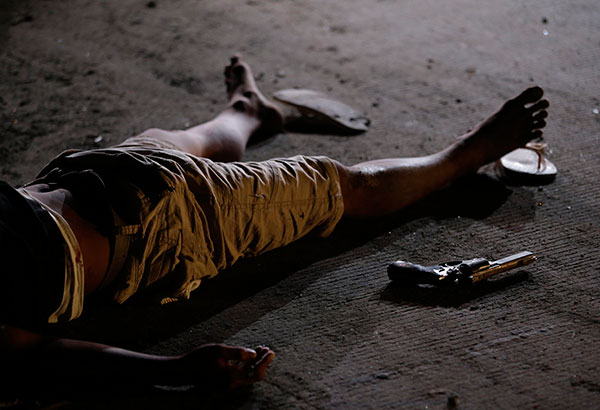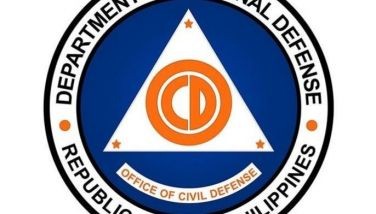Diokno urges SC to invalidate PNP, DILG orders on drug war

Jose Manuel Diokno, the chairman of a human rights group, urged to Supreme Court to invalidate two government orders that served as the basis of the administration's war on drugs. AP/Aaron Favila, File
MANILA, Philippines — A human rights lawyer on Tuesday asked the Supreme Court to declare as unconstitutional a police and an Interior department memorandum which operationalized and institutionalized the government's ferocious campaign against illegal drugs.
Jose Manuel Diokno, chairman of the human rights group Free Legal Assistance Group, warned that the Philippine National Police Memorandum Circular 16-2016 and the Department of the Interior and Local Government Memorandum Circular 112 might create an evil "more monstrous" than the problem they sought to address and were in violation of constitutional guarantees for one's life, liberty and property.
"But the war on drugs is not just killing the poor. It is killing our legal system by replacing justice from our courts with justice from the barrels of guns," said Diokno, the dean of the De La Salle University College of Law, at the oral arguments for FLAG's petition to halt the government's campaign against narcotics.
FLAG filed the petition in October asking the SC to issue a temporary restraining order stopping the implementation of MC 16-2016, the basis of the police's "Oplan Double Barrel," which was issued by PNP chief Gen. Ronald Dela Rosa.
The human rights group filed the petition for two victims of alleged extrajudicial killing, Ryan Dave Almora and Rex Aparri, and a survivor of police anti-narcotics operations, Jefferson Soriano.
Aside from assailing the two orders, FLAG also sought the issuance of a writ of amparo and a temporary protection order prohibiting cops from getting near the homes or workplaces of the families of the petitioners.
Both Almora and Aparri were killed in police anti-drug operations while Soriano survived an alleged attempt to illegally execute him.
READ: Duterte's war on drugs to face SC for first time
According to Diokno, CMC 16-2016 is unique in the "annals of law enforcement" for directing the police to "neutralize and negate" drug suspects instead of apprehending and prosecuting them.
It also ordered cops to compile lists of supposed "drug personalities" for the purpose of "neutralizing them" instead of asking lawmen to gather evidence and prosecute them, according to the law dean.
Diokno said the assailed order directed police to conduct warrantless house-to-house visitations and to neutralize drug suspects instead of seeking warrants to raid their houses.
"Never in the history of our country has this happened before. It is our hope that our court will see to it that this will never happen again," Diokno told the 15-man tribunal.
Citing pages where the words "neutralization" and "negation" appeared in the order, Diokno stressed that CMC 16-2016 ordered the neutralization of drug suspects, which in police parlance meant killing them.
"Neutralization and negation are not legal terms. They don't have a counterpart in law," he said.
READ: Solgen Calida: Petitions of families emasculate drug war
The human rights lawyer also cited pronouncements of Dela Rosa in which he used the word "neutralize" to mean to kill individuals.
According to Diokno, CMC 16-2016 allowed the killing of individuals suspected of involvement in illegal drugs without the benefit of trial or due process, a violation of the Constitution's Bill of Rights.
The law dean stressed that the mandate of the police was to investigate crimes, arrest offenders, bring them to justice and assist in their protection, but the PNP order did away with these and replaced them with the compilation of names of drug suspects for the purpose of "negating" them.
"These lists have form the backbone of the PNP's war on drugs," he said, adding that cops nationwide were mandated to regularly update these compilations.
Diokno said that the law had built-in safeguards in the process of evidence-gathering, but these were not present in CMC 16-2016.
"Under CMC-16, anyone can submit a name to the PNP even if they don't have personal knowledge of that person's involvement in illegal drugs, even if they merely believe, rightly or wrongly, that the person is involved in illegal drugs," Dioko stated.
Although the lists were validated, Diokno said the validation was internal and closed to public scrutiny. He added that there was also no mechanism to remove one's name once it was included in the compilation.
"This list is still with the PNP and poses a grave danger to the life, liberty and property of the person's whose names are on those lists. Persons, I must emphasize who are presumed innocent until they are proven guilty before a court of law" Diokno underscored.
READ: SC petitioners see 'systemic violence' in San Andres Bukid killings
The program's "Oplan Tokhang," which saw cops going from one house to another knocking on doors and pleading with suspects to stop their illegal activities, was also unconstitutional, according to the lawyer, saying that the project was based on "mere suspicion and furtive fingers of unknown informants."
"Tokhang concludes that [drug suspects] are already guilty. For why else would they be persuaded to stop their illegal activities if they are not guilty?" he asked.
The government could also not argue that Dela Rosa had the authority to issue CMC 16-2016 as a way to give tactical and deployment direction to the police.
Diokno said that it "radically" reordered the mandate of the police, authorized extralegal killings and home invasions without search warrants and trampled on basic rights enshrined and guaranteed by the Constitution.
He added that the order exceeded the authority of the PNP chief.
DILG's Memorandum Circular 2017-112 or the “Masa Masid” project, meanwhile, was unconstitutional by allowing anonymous reporting of drug suspects, according to Diokno.
"It institutionalizes a nationwide system of unknown informants whose furtive fingers could point to anyone," he said.
He underlined that the only way to fight crime was to strengthen the system and not to supplant it with justice that emanated from the barrels of the guns.
"The war on drugs as operationalized by CMC 16 and as institutionalized by MC 112 is not the right way to fight crime," he said.
READ: PNP ends Tokhang, Double Barrel
During the oral arguments, Associate Justice Marvic Leonen asked lawyer Joel Butuyan, also representing petitioners, of Center for International Law if he is familiar with the Makapili.
"By the way, counsel, are you familiar with Makapili... during the Japanese occupation?" Leonen said, asking Butuyan to also describe its operations. The SC justice asked this as he was quizzing the CenterLaw lawyer about the "Masa Masid" dropbox project which allows the reporting of suspected drug and criminal activities anonymously.
The Makapili or "Makabayang Katipunan ng mga Pilipino" is a pro-Japanese organization of military character established in 1944. They aided the Japanese in espionage during World War II.
- Latest
- Trending


























